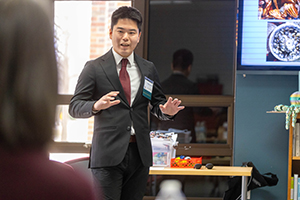Community development degree: don't just live in a community, build one
Are you the person who takes charge during group projects? Do you find yourself planning events or passionately advocating for a cause you believe in? If you see yourself making a real impact on the world around you, a community development degree might just be your calling.
This isn’t just a degree, it’s a mission. It is for the people who want to be the change they want to see in the world, not just talk about it. This degree is about building a better future through change in communities.
What exactly is a community development degree?
A community development degree is a multi-disciplinary program that teaches you how to plan and implement projects that improve the social, economic and environmental well-being of communities. You will learn the theory behind social change and use your skills to inspire real-world change. When you earn a community development degree, it isn’t about the classroom and textbooks, it is about the people.
The tactics you will be using are often combinations of sociology, public policy, urban planning, economics and social work. The goal of the material is to give you a well-rounded understanding for addressing complex problems that face a community. Not only will these skills inspire change, but everything you learn is highly valuable and translate to many careers.
Who should pursue a community development degree?
If you are an empathetic person who has a knack for problem-solving, this degree may be for you. Good communication will help you guide a large, diverse group of people towards a shared goal.
Collaboration is just as important as leadership within this field. You are the point of contact to many people with many different ideas, so patience and understanding will help you guide groups towards common ground. Having a good attitude and a willingness to find creative solutions are useful skills in the community development field
What can you do and what can it make you?
Community development degrees open up career paths in both public and private sectors, you won’t be limited to just one job. Here are some of the careers you can get with a community development degree:
- Urban or regional planning: You will help design and shape the future of cities and towns, incorporating everything from zoning laws to transportation decisions. As a town planner, you would work with local government to implement long term policies for community growth.
- Nonprofit director. You could lead an organization focused on a cause you believe in, like affordable housing, youth programs or animals rights. Some responsibilities a nonprofit director holds would be things like grant writing and strategic planning.
- Social worker. With a community development degree with a social work concentration, you will have the opportunity to work with community members who are facing challenging life circumstances, providing them with resources for mental health, employment, housing and healthcare.
- Community outreach specialist. A community outreach specialist is the bridge between the organization and the people it serves. This role requires excellent communication skills and a deep understanding of the community and the organization a community outreach specialist serves. The responsibilities associated with this position are event planning and relationship building.

- Policy analyst. As a policy analyst, you will research and evaluate policies to make sure they are actually helping the people they aim to help. This is a crucial role for anyone who is passionate for a change in the system with a skill in language and wording.
- Grant writer. You will use your skills to secure funding for important community projects. A grant writer is a critical part of every nonprofit. A grant writer creates and submits formal requests for funding so an attention to detail and creativity is necessary.
Not only would the incentive of community creation pull you towards this degree, but in a study published by ZipRecruiter.com, as of August 2025, a Community Development Director can make $112,798 dollars a year in Michigan. As with all careers, salary can be specific to the role, but there is always the possibility to grow in this field. Community development jobs are in high demand and are not going anywhere, anytime soon.
Making a difference: why it's worth it
Ultimately, a community development degree is for those who want to be more than just an employee; it is for those who want to make a change. You will be working to help people improve their lives and create a system that is equitable for all, giving everyone a chance to thrive.  If you are interested in having the toolbox to solve problems in the world, this degree is definitely worth it.
If you are interested in having the toolbox to solve problems in the world, this degree is definitely worth it.
What's the next step?
If you are considering a community development degree, CMU has great options for you. Our program focuses on preparing you for a career in government, nonprofit and private sectors, all serving the community. You will start your journey with classes in sociology, social work, community health and criminology.
After this core curriculum, you will select a concentration ranging from public administration, community service or health sciences. Each of these focuses give you the chance to specialize in what you are passionate about.
You will get hands-on experience in community development with unique classes that cater to your interests and offer opportunity to apply your classwork to real life situations. This program is flexible with online and in-person options and provides a well-rounded understanding of your chosen focus and the field as a whole.
Are you ready to turn your passion into a profession? Take the first steps and start the community development program today.